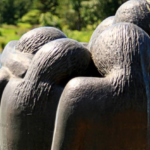The Rev’d Suzanne Grimmett reflects marriage, celibacy and how we measure goodness.
Jesus has an uncomfortable habit of raising the bar on goodness and integrity. He had a lot to say about the misuse of power and about people who hold to religious rules while placing burdens upon others that are difficult to bear. He could say things like, “You have heard it said…do not murder, do not commit adultery, do not break your oath…but I say to you…” and invariably Jesus’ words demanded more of us. The ‘more’ is always in greater goodness, selflessness and honour in the way we live out our relational lives.
At General Synod we discussed at length the terrible findings of domestic abuse research which revealed the suffering in marriages that are not mutual and honouring of the other but defaced by a dynamic of power over one another, particularly when the doctrine of male headship is invoked. These are like those white-washed tombs Jesus describes; pristine in outward appearance and in the eyes of the church, but inwardly rotten. So often in churches women, (and it is mainly women), have been counselled to practise love, forgiveness and no-matter-what commitment when their relationships have been abusive and far from the intent of marriage which is to be for mutual human flourishing. It seems a very low bar to settle for marriage between a man and a woman as the only requirement for intimate relationships without demanding that those relationships also demonstrate the fruit of the spirit.
At the same time, the church is prone to judging and pronouncing as wrong those intimate relationships between people of the same gender or those diverse in gender which are manifesting the fruit of being loving, committed, and mutually self-giving. How might we need to recognise the movement of God and, instead of relying only on the familiar rules and outward appearance, perceive more deeply the dynamics of love and mutual self-offering which point to the presence of the Holy Spirit?
In affirming churches couples diverse in gender and sexuality are enabled to live authentically and bear witness to their love of Christ and commitment to Christian service, offering their gifts to the work of the kingdom and for the good of all. The secrecy and shame laid upon the rainbow community in our churches has not only come at a terrible personal cost to those suffering under such judgement as they seek to live with honesty and authenticity, but has also robbed the church of the giftings which would have enlivened and enriched the life of the kingdom and the witness of the people of God. In a faith that centres on the hospitality of table fellowship in a diverse community, we have robbed ourselves of the joyful presence of so many who would have gathered and been active in gathering.
At General Synod the state of singleness was affirmed as “an honourable estate in which the fullness of God’s blessings may be enjoyed.” It is true that singleness is commended in scripture, but St Paul recognises that while to him singleness is an ideal state, celibacy is not everyone’s calling (1 Corinthians 7:7). It is harsh and cruel that some of those who comfortably have their intimacy needs met in a loving marriage are the ones demanding of the rainbow community that, regardless of their lack of calling to the celibate life, they must remain alone.
In a speech to General Synod +Jonathan Holland said, “It is the love that matters to Jesus, not the gender. If we see the fruits of the Spirit in any couple in a loving relationship, same-sex attracted or other-sex attracted, then God is in them and their loving relationship, for God is love and those who live in love, live in God and God lives in them.”
Can we listen to each other and seek to discern together where God’s Spirit is leading? Are we prepared to allow the Spirit of Christ to call us to a higher standard of human goodness in intimate human relationships than simply relying on the external rule of heterosexual marriage? Might we in challenging this rule begin to understand the depth and goodness of what marriage was always meant to be? Will we be known by whom we exclude or by the way we love one another?



